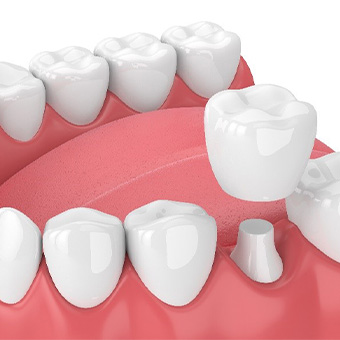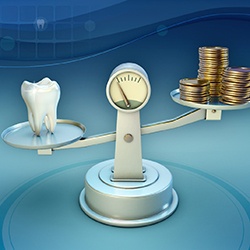Dental Crowns – McKinney, TX
Repair a Damaged Tooth, Improve Your Oral Health

If you have a tooth that is severely decayed, you need a restorative solution that blends form and function. Dental crowns do just that! Our team is proud to provide expert restorative care for patients who are struggling with a decayed, cracked, or otherwise damaged tooth. If you would like to learn more about dental crowns in McKinney – from what the process is like to the benefits of this tooth-restoring treatment – keep reading or schedule a consultation with us.
Why Choose OakBrook Dental and Orthodontics for Dental Crowns?
- Top-Rated Dental Office in McKinney
- Dental Insurance Welcome and Flexible Financing Available
- Convenient Hours, Including Saturdays
What is a Dental Crown?
A dental crown is a tooth-shaped restoration that is custom-made according to the specific dimensions of the affected tooth and securely bonded on top with special cement. Most often, they are used to:
- Restore a weak tooth.
- Restore a decayed tooth when there is not enough room for a filling.
- Hold together pieces of a broken tooth.
- Improve the occlusion of misaligned teeth.
- Improve the appearance of a cosmetically damaged front tooth.
Most crowns are made from ceramic, porcelain-fused-to-metal, gold, or metal alloys. The material that is right for you depends mostly on where in the mouth the affected tooth is located as well as your personal preference. Natural-looking ceramic is best for teeth in the front of the smile, while a sturdy gold crown may be the ideal choice for the teeth that incur more chewing force in the back of the bite.
Why is getting a regular oral cancer screening important?
The mortality rate for oral cancer is so high not because it is difficult to diagnose, but rather because it is often found too late for effective treatment. As oral cancer advances, it can metastasize to other parts of the body and become much harder to overcome. On the other hand, those whose oral cancer is discovered and treated during the early stages of development increase their likelihood of survival to up to 90 percent. By having a regular oral cancer screening with us, you can catch oral cancer sooner rather than later, improving your odds of beating it.
The Dental Crown Process?

The very first step of the process is the initial exam, which is where one of our talented McKinney dentists will determine if a dental crown is the best way to restore the health, function, and look of your smile. If it is, then we will intervene with the necessary treatment before reshaping the tooth to make room for the new restoration. We will carefully remove the enamel so that the base of the tooth is wider than the top. Then, we will take impressions and cover the tooth with a temporary crown while the permanent one is being made. This process usually takes a few weeks. However, the moment we receive it from the dental lab, we will schedule your next appointment so we can secure it in place!
The Benefits of Getting a Dental Crown

Getting a dental crown to restore a damaged tooth offers numerous benefits, including:
- The materials come in numerous enamel-like shades, ensuring the results look natural.
- It restores the function of your tooth.
- The entire process can be completed in two visits or less.
- No complicated oral hygiene – take care of your dental crown like you do your natural teeth!
- The results can last for 10+ years with the right best practices in place.
If you have a severely damaged or decayed tooth, we invite you to discuss your options in restorative dentistry with our team. Everyone deserves a healthy, complete smile – so go ahead and request an appointment today!
Understanding the Cost of Dental Crowns

Dental crowns can protect structurally compromised teeth for many years down the road. However, you may be concerned about the cost of your treatment. We won’t be able to confirm the exact cost of your new restoration until we can see you in person. In the meantime, here are some things for you to take into consideration.
Factors that Affect the Cost of Dental Crowns

Several factors determine the cost of dental crowns. Here are the most prominent ones that are considered:
- Severity of Damage: If your tooth is very damaged, you may need other treatments in addition to your dental crown. For example, if your tooth is infected, you might need to have a root canal before your crown can be placed.
- Materials Used: Dental crowns can be made from a variety of different materials, and they are all at different price points.
Does Dental Insurance Cover Dental Crowns?

Dental crowns are considered to be a major dental procedure by most dental insurance companies. Because of this, they are generally covered at about 50%. However, every plan is different, so it is best to check with your provider ahead of time so that you don’t run into any surprises. We would also be happy to help you with this, so feel free to contact us. OakBrook Dental & Orthodontics is proud to accept all PPO plans, and we are an in-network provider for most of the major ones. Medicaid is accepted as well.
Options for Making Dental Crowns Affordable

If you don’t have dental insurance, this doesn’t mean that you will be left completely on your own. We accept payments through CareCredit – a third-party financing company that can split the cost of your treatment into manageable monthly installments with little to no interest. Our team would also be happy to arrange a payment plan for you right here in our office. To learn more about your financial options, don’t hesitate to reach out to one of our friendly team members.
To find out exactly how much your dental crown will cost, schedule an appointment with us. We are eager to help restore your smile!
Dental Crowns FAQs
Does Getting a Dental Crown Hurt?
No, receiving a dental crown doesn’t involved pain. Prior to preparing the tooth for a dental crown or touching its enamel, we will give you a local anesthetic, which will completely numb the area of the mouth. If you have additional anxiety or nervousness, we can also offer you sedation to calm your fears and keep you comfortable throughout the entire process. When the anesthetic wears off, you may have some sensitivity, especially with the temporary crown, but it should be temporary. If you experience tooth pain afterward, reach out to us.
Are Dental Crowns Safe?
These days, many people are more aware about what is put into their bodies. If you are one of them, you can rest assured that your dental crown will be perfectly safe for you and your smile, especially ones made of porcelain. You will not set off metal detectors, but those with metal may slightly distort MRI scans if you need one for your head. If you have sensitivity to metal or are otherwise worried about your health and safety, feel free to discuss your concerns with us, and we can find a solution that works best for you.
What Should I Do If My Dental Crown Comes Off the Tooth?
The bonding material we use is strong, so you can rely on it to hold your crown in place. However, especially as they get older, dental crowns may be forced off the tooth. If this happens to you, give us a call right away. After rinsing it off, you can put a dab of toothpaste in the crown and place it back onto the tooth. This temporary fix should hold until you can get to us. If it is still in good condition and isn’t too old, we may be able to reattach it. Otherwise, we’ll need to replace the crown with a new one.
How Can I Make My Dental Crown Last as Long as Possible?
The length of time your dental crown lasts depends largely on how well you maintain it; fortunately, it doesn’t require a lot of extra care. Basically, you just need to do what you should already be doing for your other teeth. Daily brushing and flossing keep bacteria-filled plaque from accumulating on and near the crown, preventing cavities or infection. You also need to come in regularly for checkups and cleanings. Other healthy habits that can also extend the lifespan of your crown include eating and drinking less sugar and having more water throughout the day.

